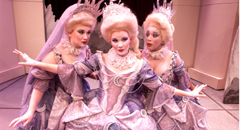Three women float onto the stage in wide, corseted, glittering gowns of lavender and black.
In their long gray hair rest tiaras and in their hands are spears as big as the actors who hold them.
They dual comically over a prince who lies on the ground, fallen at the claws of a serpent monster.
This is the opening scene of Mozart’s “The Magic Flute,” the student opera that opens this weekend in Roussel Hall.
“The Magic Flute” is Mozart’s final, and some say best opera.
He wrote it in 1791, shortly before he died.
“It could arguably be the greatest Mozart opera because it’s so full of wonderful characters and humanity and it’s got fantastic music,” said Carol Rausch, musical director.
Mozart wrote the opera in German.
It will, however, be performed in English for the sake of accessibility to the audience and the actors who benefit from a complete understanding of their words.
The story is a complex layering of perilous journeys played out in the name of love.
The primary story is that of Prince Tamino, who must jump through hoops of fairy tale proportions to rescue his kidnapped Princess Pamina.
His assistants are a magic flute and a birdman named Papageno, who is told that if he helps the prince on the journey he will be granted a wife by the gods.
As the story unfolds, characters face treachery and poignant moments of love.
The script is infused with humor and kitsch, complete with absurd characters and comments directed to the audience.
“There’s a lot of comedy in the opera so even people who aren’t big opera fans will still find things to enjoy about it,” said vocal performance freshman Vernon DiCarlo, who plays Prince Temino.
The student actors featured in the opera began rehearsing in September, during and outside of their workshop class.
They also sacrificed two weeks of their winter vacation, returning to school early for rehearsal.
“It’s a lot of work, but most art is. You’ve got to love it and be dedicated,” said music business sophomore Annelise Cassar, who plays Papagena, the birdman’s eventual wife.
Though the singers all have different past experiences with opera, they united on a love for the form.
“In opera, there’s a perfect dichotomy of music and acting. It’s putting life out on stage in the form of music,” said vocal performance sophomore Justin Hopkins, who plays the kidnapper Sarastro.
Director David Morelock decided to double-cast most of the principal roles.
He did this in order to give students the most possible chances to play the lead characters.
He also runs the production as professionally as possible.
“It’s important to give the students a complete professional experience. You have to bring them up to another level,” Morelock said.
The actors admit that working under Morelock has required hard work and dedication.
They are proud of what it has taught them.
“He will stop a rehearsal right in the middle if your hat isn’t on the right way, and we wouldn’t want it any other way,” Hopkins said.
Morelock’s professionalism also greatly benefits students who are trying to prepare for the real world of professional singing and opera.
“He’s not treating you like a student, which is good because he’s trying to prepare us for the real world,” said vocal performance senior Sarah Spooner, who also plays Papagena.
A full orchestra accompanies the singers.
It is made up of both Loyola music students and instructors.
Though the majority of the musicians and the actors are students, Rausch believes that it will draw many opera fans.
“I think where the Loyola opera always scores is that it’s fresh young talent tackling these roles for the first time. It’s very impressive because they are very fine young singers,” Rausch said.
In addition to showcasing the musical skills of students, the opera features elaborate costumes, thunder and lighting effects, fog, and creeping monsters.
Now that the long rehearsal process is coming to a close, the actors are looking forward to showing audiences what all of their hard work has created.
“There’s a sense of extreme accomplishment in knowing how long we’ve been working at it, at times thinking it wouldn’t come together as it has,” Hopkins said.
“It’s a sense of relief even though we haven’t put it on yet.”
What some of the actors said they have enjoyed most in the process is the camaraderie that has developed in the cast.
“Even if you didn’t know someone in the beginning, by now we’ve bonded through sharing dressing rooms and running around frantic with each other. We’ve gotten really close,” Spooner said.
The opera opens today at 7:30 p.m. in Roussel Hall.
General admission is $20, with a student rate of $10.
The only other performance is a 3 p.m. matinee show on Sunday.

(Photo Courtesy of Loyola)

The birdman Papageno (Nick Missios) checks out a bird. Papageno is helping Prince Tamino to rescue the kidnapped Princess Pamina. (Photo Courtesy of Loyola)






